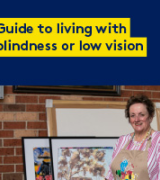Introduction
You may find your loved one approaches living with a vision condition in different ways. It’s common for many people to experience a range of difficult emotions, and they may not be aware of the supports they need.
Others may wish to seek help from people they trust or others who have faced similar experiences.
If you’re a parent, finding out your child has vision loss can be confronting and confusing.
There’s a range of emotional, practical and financial supports for people who are blind or have low vision.
Living with vision loss guide
Our Living with Vision Loss guide covers the range of supports and a handy step-by-step checklist.
Supports include:
- Emotional, peer-to-peer and social groups with others with lived experience.
- Equipment and technology that enable them to do daily tasks independently.
- Strategies and equipment to use the home safely.
- Services for babies, children and young people.
- Training and support to travel independently.
- Government funding and subsidies.
All our services are delivered by qualified healthcare professionals who specialise in working alongside your loved one to understand their goals and determine the best way to reach them.
While every person naturally has specific needs and interests, the common theme in our services is seeing how we can help the person you love live independently.











